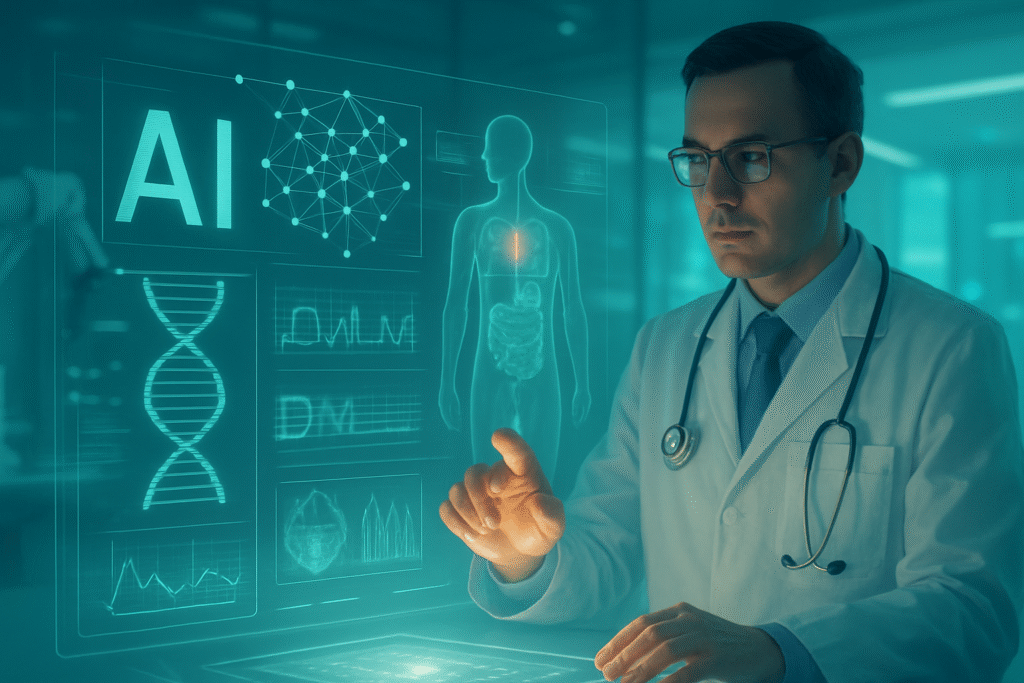
Artificial intelligence (AI) stands at the precipice of a profound transformation in healthcare, promising a future where diagnostics are sharper, treatments are more personalized, and patient care is more accessible and efficient. This digital revolution, however, is unfolding amidst a complex landscape of groundbreaking scientific advancements and pervasive misinformation, making it crucial to discern genuine progress from speculative hype. From accelerating drug discovery to revolutionizing surgical precision, AI's immediate significance in the current medical landscape is undeniable, poised to redefine how we understand, prevent, and treat disease.
The integration of AI into healthcare is not merely an incremental upgrade but a paradigm shift, offering solutions to some of the most enduring challenges in medicine. It promises to enhance diagnostic accuracy, personalize treatment pathways, streamline administrative burdens, and ultimately improve patient outcomes on a global scale. Yet, this promise comes with its own set of complexities, including ethical considerations, data privacy concerns, and the critical need for robust validation and transparent deployment to ensure equitable and effective care for all.
Unpacking the AI Toolkit: Precision, Prediction, and Personalized Pathways
The technical advancements driving AI's ascent in healthcare are multifaceted, leveraging sophisticated algorithms and vast datasets to achieve feats previously thought impossible. At its core, AI's power stems from its ability to analyze complex medical data – from genomic sequences and electronic health records to intricate medical images – at speeds and scales far beyond human capacity. This analytical prowess underpins its transformative impact across medical research, diagnostics, and patient care.
In medical research and drug discovery, AI is dramatically accelerating the pace of innovation. Traditional drug development is a notoriously lengthy and expensive process, often taking over a decade and billions of dollars with a high failure rate. AI is changing this by identifying novel therapeutic targets, designing new molecular compounds, and predicting drug efficacy and toxicity with unprecedented accuracy. Machine learning models can sift through vast chemical libraries, simulate molecular interactions, and even predict how a drug might behave in the human body, significantly shortening preclinical phases. This contrasts sharply with traditional methods that rely heavily on laborious laboratory experiments and trial-and-error approaches. Furthermore, AI optimizes clinical trial design by identifying suitable patient cohorts and predicting potential outcomes, thereby reducing costs and accelerating time-to-market for new medications.
Diagnostics is another area experiencing a profound AI-driven overhaul. AI algorithms, particularly deep learning models, are demonstrating superior capabilities in analyzing medical images such as X-rays, CT scans, MRIs, and pathology slides. For instance, AI can detect subtle anomalies indicative of cancers (breast, lung, prostate, brain tumors), diabetic retinopathy, and neurological disorders often earlier and more accurately than the human eye. These systems can flag urgent cases in real-time, prioritize radiologists' workloads, and even identify signs of disease years before clinical manifestation. Unlike conventional image analysis, which relies on human interpretation and subjective assessment, AI provides objective, data-driven insights, reducing diagnostic uncertainty and improving consistency across different healthcare providers. Initial reactions from the medical community have been largely positive, recognizing AI as a powerful augmentative tool that enhances, rather than replaces, human expertise, particularly in high-volume screening and complex case analysis.
In patient care, AI is paving the way for truly personalized and predictive medicine. By integrating a patient's unique genomic data, medical history, lifestyle factors, and real-time physiological monitoring from wearables, AI can create tailored treatment plans, predict disease progression, and forecast individual responses to medications. This shift from a one-size-fits-all approach to highly individualized care aims to deliver more targeted and effective treatments while minimizing adverse effects. AI-powered clinical decision support systems (CDSS) are being integrated into electronic health records (EHRs) to provide physicians with real-time insights, evidence-based recommendations, and alerts for potential drug interactions or missed diagnoses. This proactive, data-driven approach marks a significant departure from reactive care models, promising a future where healthcare is not just about treating illness but actively preventing it.
The Corporate Calculus: Winners, Losers, and Market Disruption
The transformative potential of AI in healthcare has ignited a fierce competitive landscape, with established tech giants, pharmaceutical behemoths, and agile startups vying for dominance. This development stands to profoundly impact market positioning, strategic advantages, and the very fabric of existing healthcare products and services.
Leading the charge are tech giants like Alphabet (NASDAQ: GOOGL), Microsoft (NASDAQ: MSFT), and Amazon (NASDAQ: AMZN), which possess the vast computational resources, cloud infrastructure, and AI research capabilities necessary to develop and deploy sophisticated healthcare AI solutions. Google's DeepMind, for example, has made significant strides in areas like protein folding with AlphaFold and medical imaging analysis. Microsoft is heavily investing in AI for clinical decision support and drug discovery through partnerships with pharmaceutical companies. Amazon, through AWS, provides the backbone for many healthcare AI applications and is exploring direct healthcare delivery with AI-enhanced services. These companies stand to benefit immensely by integrating AI into their existing cloud services, expanding their enterprise offerings to hospitals and research institutions, and potentially even disrupting traditional healthcare providers.
Pharmaceutical companies such as Pfizer (NYSE: PFE), Novartis (NYSE: NVS), and Roche (OTCMKTS: RHHBY) are also major beneficiaries, leveraging AI to streamline their R&D pipelines. AI-driven drug discovery platforms are becoming indispensable for identifying new targets, synthesizing compounds, and accelerating preclinical testing, promising to reduce the astronomical costs and timelines associated with bringing new drugs to market. This technological leap provides a significant competitive advantage to companies that effectively integrate AI into their research strategies, potentially leading to a faster and more efficient development of blockbuster drugs.
The landscape is also teeming with innovative startups specializing in niche AI healthcare applications. Companies like PathAI (AI-powered pathology), Tempus (precision medicine and oncology), Viz.ai (AI for stroke and vascular care), and Insitro (machine learning for drug discovery) are attracting substantial venture capital funding. These startups often focus on specific medical domains, developing highly specialized algorithms and datasets that can outperform general-purpose AI. Their agility and focus allow them to quickly innovate and carve out significant market shares, potentially disrupting established medical device manufacturers and diagnostic laboratories that are slower to adapt. The competitive implication is a race to acquire or partner with these innovative startups, as larger players seek to integrate their cutting-edge technologies.
However, this disruption also poses challenges. Traditional healthcare providers and medical device companies that fail to adopt AI risk being left behind. Existing products and services, particularly in diagnostics and medical imaging, may face obsolescence if they cannot integrate AI-driven enhancements. The market is shifting towards AI-as-a-service models, where specialized algorithms and analytical tools are licensed to healthcare organizations. This creates a strategic advantage for companies that can build robust, regulatory-compliant, and clinically validated AI platforms. The long-term implications include a potential consolidation of the healthcare technology market around AI-centric solutions, forcing incumbents to innovate or acquire to remain competitive.
Broader Horizons: Ethical Imperatives and Societal Shifts
The integration of AI into healthcare extends far beyond technological advancements, ushering in a broader societal shift with profound implications for ethical considerations, data governance, and equitable access. This transformative wave fits squarely into the broader AI landscape, where the push for intelligent automation and data-driven decision-making is reshaping industries globally.
One of the most significant impacts is the potential to democratize and standardize healthcare. AI can bring high-quality diagnostic and treatment support to underserved regions lacking specialized medical professionals. For instance, an AI system trained on millions of medical images can provide expert-level diagnostic assistance in remote clinics, bridging geographical gaps in care. However, this potential is tempered by critical concerns, particularly algorithmic bias and fairness. If AI models are trained on datasets predominantly representing certain demographics, they may perform poorly or even exacerbate health disparities for underrepresented groups. This raises urgent ethical questions about ensuring equitable outcomes and preventing the perpetuation of systemic biases within healthcare.
Data privacy and security represent another paramount concern. AI systems thrive on vast amounts of sensitive patient data, from electronic health records to genomic information. Ensuring robust data protection, adherence to regulations like HIPAA and GDPR, and obtaining informed patient consent are non-negotiable. The "black box" problem, where the decision-making process of complex AI algorithms is opaque, also presents a challenge for accountability and trust, particularly in critical diagnostic or treatment recommendations. Healthcare professionals and patients need to understand why an AI system made a particular recommendation.
Comparisons to previous AI milestones highlight the current moment's significance. While earlier AI applications in healthcare often focused on expert systems and rule-based logic, today's advancements, particularly in deep learning and large language models, offer unparalleled analytical power and adaptability. This evolution marks a shift from assistive tools to truly augmentative and even predictive capabilities. The societal impact is immense, ranging from improved public health outcomes through AI-driven disease surveillance and outbreak prediction to the potential for a more proactive and preventative healthcare system. However, these benefits must be carefully balanced with the need for robust ethical frameworks, regulatory oversight, and continuous vigilance against potential misuse or unintended consequences.
The Road Ahead: Navigating the Future of AI in Medicine
The trajectory of AI in healthcare points towards an exciting, albeit challenging, future, with numerous developments expected in both the near and long term. Experts predict that AI will become an increasingly indispensable part of the medical toolkit, evolving from a supportive role to a more integrated and autonomous function in certain areas.
In the near term (1-5 years), we can expect to see wider adoption and refinement of existing AI applications. AI-powered diagnostic tools for medical imaging will become more commonplace, offering enhanced accuracy and efficiency in radiology and pathology departments. Personalized medicine will advance significantly, with AI integrating more complex multi-omic data (genomics, proteomics, metabolomics) to create highly individualized treatment plans for conditions like cancer and rare diseases. Clinical decision support systems will become more sophisticated, offering real-time, context-aware recommendations to clinicians directly within electronic health records. Furthermore, AI will play an increasingly critical role in ambient clinical intelligence, where AI listens to doctor-patient conversations and automatically generates clinical notes, freeing up physicians from administrative burdens.
Longer-term developments (5-10+ years) envision AI playing a more proactive and predictive role. We could see the emergence of "digital twins" – AI models of individual patients that simulate disease progression and treatment responses, allowing for highly accurate personalized interventions. AI-driven drug discovery will move beyond target identification to de novo drug design, creating entirely new therapeutic molecules with optimized properties. Autonomous AI systems may assist in complex surgical procedures, enhancing precision and reducing invasiveness. Telemedicine and remote patient monitoring, already boosted by AI, will become even more sophisticated, enabling continuous, proactive health management and early intervention for chronic conditions, potentially reducing hospitalizations.
However, several challenges need to be addressed for these developments to fully materialize. Data interoperability and standardization remain critical hurdles, as healthcare data is often fragmented across different systems and formats. Regulatory frameworks need to evolve rapidly to keep pace with technological advancements, ensuring the safety, efficacy, and ethical deployment of AI in clinical settings. Trust and acceptance from both healthcare professionals and patients are paramount, requiring transparent, explainable AI models and robust validation studies. Addressing algorithmic bias will require diverse training datasets and rigorous testing to ensure equitable outcomes across all patient populations.
Experts predict a future where AI acts as a powerful co-pilot for clinicians, augmenting human intelligence and empathy rather than replacing it. The focus will shift towards human-in-the-loop AI, where critical decisions always involve human oversight. The next wave of innovation is likely to focus on federated learning to address data privacy concerns, allowing AI models to be trained on decentralized datasets without the need to centralize sensitive patient information. We also anticipate significant advancements in generative AI for synthetic data generation, which can help overcome data scarcity issues and improve model robustness without compromising patient privacy.
The AI Imperative: A New Era in Healthcare
The advent of AI in healthcare marks a pivotal moment in medical history, signifying a profound shift towards a more intelligent, precise, and patient-centric approach. The key takeaways from this revolution are clear: AI is not merely an incremental improvement but a fundamental re-imagining of medical research, diagnostics, and patient care. Its ability to process vast datasets, identify subtle patterns, and offer predictive insights promises to unlock new frontiers in understanding and combating disease.
This development's significance in AI history cannot be overstated; it represents one of the most impactful real-world applications of advanced artificial intelligence to date. From accelerating drug discovery timelines and personalizing treatment protocols to enhancing diagnostic accuracy and streamlining administrative tasks, AI is poised to elevate the standard of care across the globe. While the journey is fraught with challenges, including ethical dilemmas, data privacy concerns, and the need for robust regulatory frameworks, the potential benefits far outweigh the complexities. The ongoing efforts to address algorithmic bias and ensure transparency are crucial steps towards building trust and ensuring equitable access to AI-powered healthcare solutions.
Looking ahead, the long-term impact of AI in healthcare will likely be measured in improved patient outcomes, increased life expectancy, and a more efficient, accessible, and sustainable healthcare system. As we move into the coming weeks and months, it will be critical to watch for further advancements in AI integration into clinical workflows, new regulatory guidelines, and the continued emergence of innovative startups pushing the boundaries of what's possible. The synergy between human expertise and artificial intelligence promises to usher in an unprecedented era of medical progress, transforming healthcare for generations to come.
This content is intended for informational purposes only and represents analysis of current AI developments.
TokenRing AI delivers enterprise-grade solutions for multi-agent AI workflow orchestration, AI-powered development tools, and seamless remote collaboration platforms.
For more information, visit https://www.tokenring.ai/.





